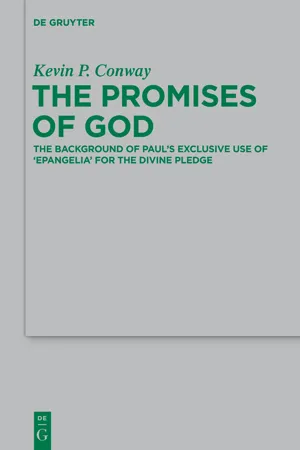
- 315 pages
- English
- ePUB (mobile friendly)
- Available on iOS & Android
The Promises of God
About This Book
This study is the first to investigate why Paul makes exclusive use of 'epangelia' for the divine pledge when referring to the Abrahamic covenant, a usage of the term never found in the OT-LXX. After examining Jewish writings and Greek literature of the classical and Hellenistic periods, this study demonstrates that Paul is rather unique in his exclusive use of the 'epangelia' word group for the divine pledge and for using the term predominantly in reference to the Abrahamic promises. This exclusive usage is further deemed unexpected in that the 'horkos' and 'omnymi' lexemes are by far the terms most commonly associated with God's promises to Abraham in the OT, the literature with which Paul was most familiar. The study then moves to explain why Paul has chosen this path of discontinuity, where it is argued that Paul's exclusive choice of 'epangelia' for the divine promise is driven by its conceptual and linguistic correspondence with the 'euangelion', one of the terms Paul adopted from the early church that forms the core of his ministry. This conceptual word study of the divine promise will benefit Pauline scholars interested in Paul's use of the OT as well as his association of the 'euangelion' and 'epangelia' word groups.
Frequently asked questions
Information
1 Introduction and Method
1.1 Introduction
history in the OT. This is the more striking
because on the basis of Paul’s teaching we tend
to consider the OT from the standpoint of
promise.1

Table of contents
- Beihefte zur Zeitschrift für die neutestamentliche Wissenschaft
- Title Page
- Copyright Page
- Acknowledgments
- Table of Contents
- Citations
- Abbreviations
- 1 Introduction and Method
- Part One: Paul’s Uniqueness in His Exclusive Use of ἐπαγγελία for the Divine Promise
- Part Two: Paul’s Reasons for Exclusively Using for the Divine Promise
- Bibliography
- Index of Scriptures and Other Ancient Writings
- Index of Ancient Authors
- Index of Greek and Hebrew Words
- Subject Index